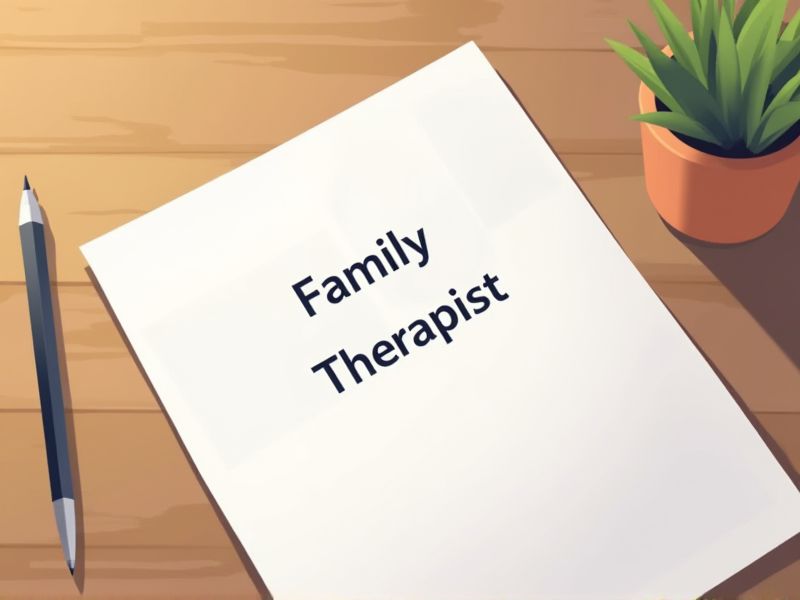
Family therapists deal with complex interpersonal dynamics that require specialized knowledge and skills. Certain certifications ensure that therapists have met high standards of education and training in fields such as psychology, counseling, and conflict resolution. These credentials also provide clients with confidence that the therapist is competent in addressing family-related issues like communication challenges and behavioral disorders. Here are some important certifications you may need to become a family therapist.
Licensed Marriage and Family Therapist (LMFT)
Licensed Marriage and Family Therapists (LMFTs) are needed for their specialized training in understanding complex family dynamics and interpersonal relationships. Their expertise in systemic therapy helps identify patterns and issues that might not be visible to those within the family, promoting healthier interactions. LMFTs are equipped to address a variety of mental health issues, reducing risk factors through evidence-based interventions. Their licensure ensures they meet rigorous standards, providing clients with assurance of their professional competence and commitment.
Certified Family Therapist (CFT)
Family dynamics can be complex, and a Certified Family Therapist (CFT) brings specialized knowledge to navigate these intricacies. A CFT's training equips them with proven strategies to address relationship issues and improve communication within families. Without a CFT, families may struggle to identify underlying problems that professionals are trained to discern. The certification ensures adherence to ethical standards and best practices, providing families with a reliable and structured approach to therapy.
National Certified Counselor (NCC)
Holding the National Certified Counselor (NCC) credential demonstrates a commitment to maintaining high professional standards, which instills confidence in clients and colleagues alike. It ensures that a family therapist has met rigorous educational and experience requirements, aligning their practice with evidence-based methodologies. This certification fosters continuous professional development, encouraging counselors to stay updated with the latest research and trends in family therapy. Access to a broad network of certified professionals can also enhance collaborative efforts and resource-sharing, ultimately benefiting the families served.
Licensed Clinical Social Worker (LCSW)
A Licensed Clinical Social Worker (LCSW) provides specialized clinical training that is essential for understanding and addressing complex family dynamics. Their expertise in mental health enables them to identify and treat underlying behavioral and emotional issues impacting family relations. They are adept at creating tailored intervention plans that incorporate evidence-based practices to facilitate effective communication within families. LCSWs possess the credentials required to work collaboratively with other healthcare professionals, ensuring comprehensive support for family members dealing with various challenges.
Certified Clinical Mental Health Counselor (CCMHC)
A Certified Clinical Mental Health Counselor (CCMHC) possesses advanced expertise in diagnosing and treating complex mental health issues, making them highly competent in addressing the intricate dynamics present in family therapy. Their extensive training in evidence-based practices equips them to create structured interventions that can effectively improve family communication and resolve conflicts. The rigorous certification process ensures that CCMHCs adhere to ethical standards and maintain cultural competence, which is essential for understanding and respecting diverse family backgrounds. In family therapy, the presence of a CCMHC can facilitate a more comprehensive and nuanced approach to treatment, ultimately fostering healthier relationships within the family unit.
Certified Sex Therapist (CST)
A Certified Sex Therapist (CST) is essential for a family therapist because sexual issues can significantly impact family dynamics and relationships. They provide specialized knowledge to address complex sexual concerns, which general family therapists might not have. Addressing sexual dysfunctions or issues can lead to improved overall family communication and relationship satisfaction. Families often experience interconnected emotional and sexual challenges, making the CST's expertise beneficial for holistic therapy outcomes.
Certified Trauma Professional (CTP)
A Family Therapist with a Certified Trauma Professional (CTP) credential gains specialized skills to effectively address the complex impact of trauma on family dynamics. Trauma can disrupt communication and trust within families, leading to long-term emotional and relational challenges. By understanding trauma's effects, a CTP-equipped therapist can implement evidence-based interventions that promote healing and resilience among family members. This certification ensures therapists are better prepared to handle cases involving trauma, ultimately improving therapeutic outcomes for families.
Certified Addictions Counselor (CAC)
Certified Addictions Counselors provide specialized knowledge on substance use disorders, which is crucial for family therapists addressing addiction's impact on family dynamics. Substance abuse often affects interpersonal relationships, necessitating expertise in addiction for effective family intervention. Family therapists benefit from understanding the psychological underpinnings of addiction, which CACs are trained to provide. Integrating addiction counseling ensures a holistic approach, supporting recovery and relational healing.
Certified Alcohol and Drug Counselor (CADC)
Having a Certified Alcohol and Drug Counselor on a family therapy team provides specialized knowledge to address substance abuse issues, which frequently impact family dynamics. Substance abuse is often intertwined with mental health conditions, and a CADC is equipped to handle complex dual-diagnosis cases. CADCs can offer targeted interventions and strategies that empower families to support loved ones struggling with addiction. The presence of a CADC enhances the overall efficacy of treatment plans by integrating expertise in addiction recovery alongside family therapy methods, leading to more comprehensive care.
Registered Play Therapist (RPT)
Incorporating a Registered Play Therapist within family therapy can enhance communication, especially when children are unable to articulate their feelings verbally. The play therapy techniques utilized by RPTs facilitate a deeper understanding of familial dynamics as they reveal underlying issues through symbolic play. Children's behavioral changes often become apparent more quickly with an RPT present, enabling early intervention and resolution. Integrating an RPT can foster an environment of trust and emotional safety for young members, thereby enhancing the efficacy of family therapy overall.
Summary
Gaining certification as a family therapist can enhance your credibility and professional standing. This recognition often increases client trust, leading to more referrals and a broader client base. Certification can also provide you with advanced skills, enabling you to address complex family dynamics more effectively. Consequently, certified therapists may see an improvement in client outcomes and career opportunities.
